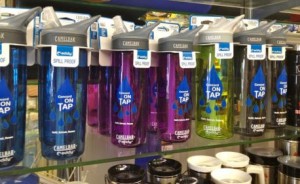Let’s Ban Disposable Plastic Water Bottles!
After completing my first week of more sustainable living, I found it much easier to leave the plastic water bottle behind than I initially thought. Most days I remember to fill my reusable water bottle at home before leaving for the day. As most of my classes are in Acopian, there are two water bottle refill stations on the main floor, making refilling my water bottle very simple. Although there are many water fountains around campus, I prefer the filtered refill stations due to taste. One of the water bottle refill stations on the Civil Engineering floor of Acopian even records how many plastic water bottles have been saved due to the refilling of water bottles. In the circumstance that I do forget my reusable water bottle at home, I simply use the water fountain or wait until I am home. Personally, the cost of purchasing a plastic water bottle does not outweigh the desire for filtered water. As we all know, we are college students, we cannot afford a new Disani water bottle every day, that would cost about $530 per year (assuming the average cost of a single water bottle is $1.45). I have noticed a difference in my habits throughout the week, like my morning routine. As this week progressed I find myself even more perplexed as to why, as a country, we rely so heavily on bottled water. I have an easier time understanding plastic water bottle use in undeveloped country where their water supply is contaminated and unfiltered. There is very little reason for over 30 Billion plastic water bottles to be sold in the United States annually (Statistic Brain, 2014). Not only does this create an unimaginable amount of waste, the amount of energy wasted on the production and distribution of plastic water bottles is absurd. Over 1.5 million barrels of oil are used annually to meet the demand of U.S. water bottle manufacturing. This amount of oil could be used to power over 100,000 homes for a year (The Water Project, 2014). As a civil and environmental engineering major, the energy crisis, as well as the clean water issue, are major areas of focus. Sustainable energy has forced its way to the forefront of the climate change issue, thus making this extreme amount of oil use very significant. If more people ditched their disposable plastic water bottles for the more economical reusable ones, we could begin to greatly impact the energy issues.

While researching the disposable plastic water bottle issue, I found an article about Concord, MA, where they implemented a ban on selling single-serve (less than 1 liter) plastic water bottles. This bylaw came into affect January 1, 2013 (Locker, 2013). For the most part, this article discusses the regulations and rules of this law. The main points brought up against the ban the economic lose local stores may feel as well as the inconvenience factor (Locker, 2013). One exception to this law is in time of an emergency which is one aspect of the ban I did not think about, however makes sense. Many residents of Concord are upset with this law, declaring it impinges on their freedom of choice and add, that this will have no positive effect on the environment because they will simply drive further to buy the plastic water bottles in neighboring towns (Locker, 2013). I however do not completely agree with this thought process, especially considering how much easier it is to refill a reusable water bottle at home, rather than getting in your car and driving to a store to get a water bottle. Along with Concord, dozens of national parks have banned the selling of disposable plastic water bottles in an attempt to decrease trash in the parks. As the second week approaches, I feel confident that I can continue living more sustainable, and avoided those terrible disposable plastic water bottles.
Works Cited:
Locker, Melissa. “Massachusetts Town Bans Plastic Water Bottles.” TIME. 04 Jan 2013: 1. Web. 31 Mar. 2014. <http://newsfeed.time.com/2013/01/04/massachusett-town-bans-plastic-water-bottles/>.
http://www.statisticbrain.com/bottled-water-statistics/
http://thewaterproject.org/bottled_water_wasteful.asp
Leave a Reply